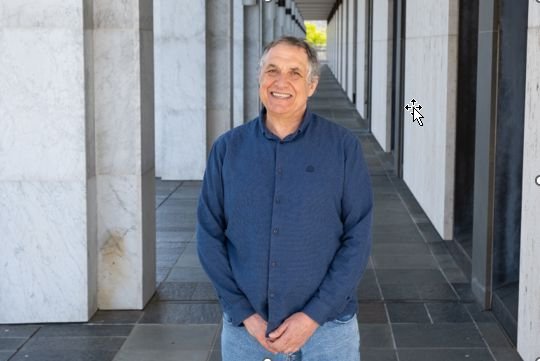The National Library has a range of Fellowships and Scholarships available to researchers, writers, artists, and younger scholars.
We spoke to Dr Bill Mihalopoulos, a Lecturer in Asian Pacific Studies at the University of Central Lancashire and a 2021 recipient of the National Library of Australia Fellowship for Japan Studies, about his time at the Library.

Why did you want to study at the National Library?
There are a couple of reasons why I was keen to study at the National Library. The Library is a jewel for access to research material that has been built, quite painstakingly, over many years. I was interested in the material that is held within the large Harold S Williams collection on Japan and the West, as these manuscripts dovetail with my own interests.
It is also a great research library that has resources unparalleled to my home institute. The place where I am based, the University of Central Lancashire, does not hold the wealth of resources available needed for my research into ‘Liberty shackles: freedom, consent and sexual servitude in modern Japan’.
My fellowship was for 12 weeks, which I was originally due to be undertake in 2021. The pandemic had other plans and I delayed my arrival to Canberra until 2022.
How did your time at the National Library help you to advance your research?
The time I spent at the Library was invaluable. It allowed me to spend concentrated time on my research topic and enabled access to wonderful research facilities and the manuscripts.
The time and access enabled me to widen my project in ways I couldn’t have imagined if I hadn’t gone and I am very grateful for that. It also allowed me to look at the project in more depth.
What do you hope people learn from your project? What did you discover that you want to share?
My project examines how notions of consent entered Japan in 1872. These notions of consent were first applied to licenced prostitution contracts. My research examines when this was introduced and modelled in Japan, and how these notions of consent in contract have transformed over time. My hope is this research will be of interest and value to others.
Why would you recommend the Library’s Fellowship program to others?
The Harold S Williams Trust is a very forward-looking trust. It was established as a private trust by the Williams family at a time when there was a great interest in Australia-Japanese relations. It’s been an honour to have been involved with the Trust.
I would highly recommend working at the National Library of Australia. It’s friendly, it has very good resources, and the Library staff go out of their way to ensure that your stay is as productive as possible. I was stoked when I found out that I was a recipient of a Fellowship.
The process of applying was not onerous. I would recommend potential applicants review the manuscript holdings of the Library and build their application around that.
This Fellowship allowed me to develop my research project into hopefully something that is worthwhile to publish.
The Library’s Fellowship for Japan Studies is supported by the Harold S Williams Trust. The Harold S Williams collection consists of books, manuscripts, photographs and artworks on Japan and the West.
This Fellowship aims to promote the Library’s collections as a national resource for the study of Asia. It encourages research and new publications based on the Library’s Japanese collections.
You can read more about the National Library’s Fellowship and Scholarship programs on our website.
Please note: The National Library is undertaking a review of its Fellowships and Scholarships program to ensure it meets the needs of researchers, PhD students and creators. This review may result in changes to some of the opportunities offered beyond 2024.